Key Concepts in Environmental Engineering
- Environmental Sustainability: Understand the principles of sustainability and how they apply to engineering practices. Learn about sustainable development and the importance of preserving natural resources.
- Air and Water Pollution: Study the sources and effects of air and water pollution, as well as the technologies used to control and mitigate these environmental issues.
- Waste Management: Explore the various methods of waste disposal, recycling, and treatment of hazardous materials. Understand the concept of sustainable waste management.
- Renewable Energy: Learn about alternative energy sources such as solar, wind, and hydroelectric power, and their role in reducing dependence on fossil fuels.
- Environmental Impact Assessment: Understand the process of evaluating the potential environmental effects of a proposed project or development.
- Environmental Regulations: Familiarize yourself with laws and regulations related to environmental protection and learn about the role of environmental engineers in compliance and enforcement.
Skills and Tools
- Technical Skills: Develop proficiency in using environmental modeling software, GIS (Geographic Information Systems), and other tools for analyzing environmental data.
- Problem-Solving: Hone your ability to identify, analyze, and solve environmental problems through engineering solutions.
- Communication: Practice effective communication skills for collaborating with multidisciplinary teams and conveying technical information to non-technical audiences.
- Regulatory Knowledge: Stay updated with environmental regulations and policies to ensure compliance in engineering projects.
- Sustainability Perspective: Embrace a holistic approach to engineering that considers the long-term impact on the environment and society.
◂Science Worksheets and Study Guides Seventh Grade. Weathering of rocks and soil formation
Study Guide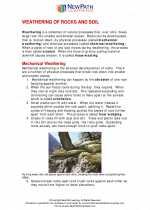 Weathering of rocks and soil formation
Weathering of rocks and soil formation  Activity Lesson
Activity Lesson Weathering of Rocks
Weathering of Rocks  Worksheet/Answer key
Worksheet/Answer key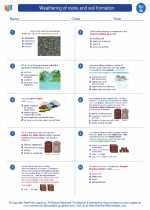 Weathering of rocks and soil formation
Weathering of rocks and soil formation  Worksheet/Answer key
Worksheet/Answer key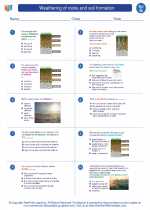 Weathering of rocks and soil formation
Weathering of rocks and soil formation  Worksheet/Answer key
Worksheet/Answer key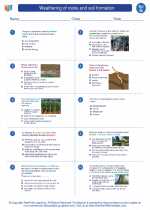 Weathering of rocks and soil formation
Weathering of rocks and soil formation  Worksheet/Answer key
Worksheet/Answer key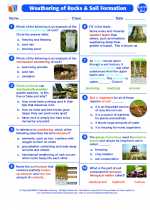 Weathering of rocks and soil formation
Weathering of rocks and soil formation  Vocabulary/Answer key
Vocabulary/Answer key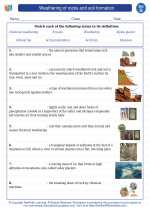 Weathering of rocks and soil formation
Weathering of rocks and soil formation  Vocabulary/Answer key
Vocabulary/Answer key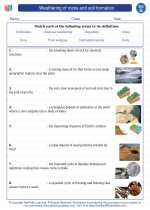 Weathering of rocks and soil formation
Weathering of rocks and soil formation  Vocabulary/Answer key
Vocabulary/Answer key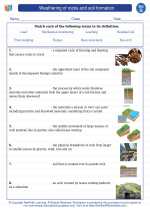 Weathering of rocks and soil formation
Weathering of rocks and soil formation  Vocabulary/Answer key
Vocabulary/Answer key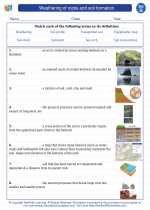 Weathering of rocks and soil formation
Weathering of rocks and soil formation 

 Activity Lesson
Activity Lesson
 Worksheet/Answer key
Worksheet/Answer key
 Worksheet/Answer key
Worksheet/Answer key
 Worksheet/Answer key
Worksheet/Answer key
 Worksheet/Answer key
Worksheet/Answer key
 Vocabulary/Answer key
Vocabulary/Answer key
 Vocabulary/Answer key
Vocabulary/Answer key
 Vocabulary/Answer key
Vocabulary/Answer key
 Vocabulary/Answer key
Vocabulary/Answer key

The resources above cover the following skills:
LIFE SCIENCE
Unity and Diversity
Analyze and interpret data for patterns of change in anatomical structures of organisms using the fossil record and the chronological order of fossil appearance in rock layers.